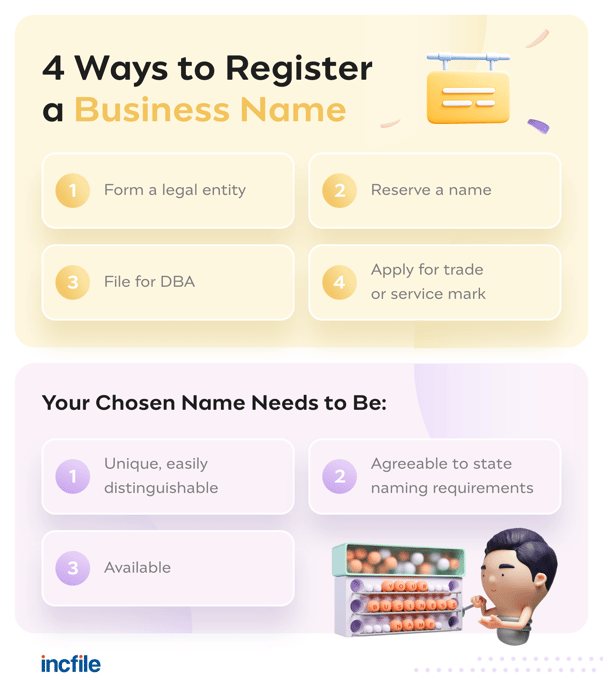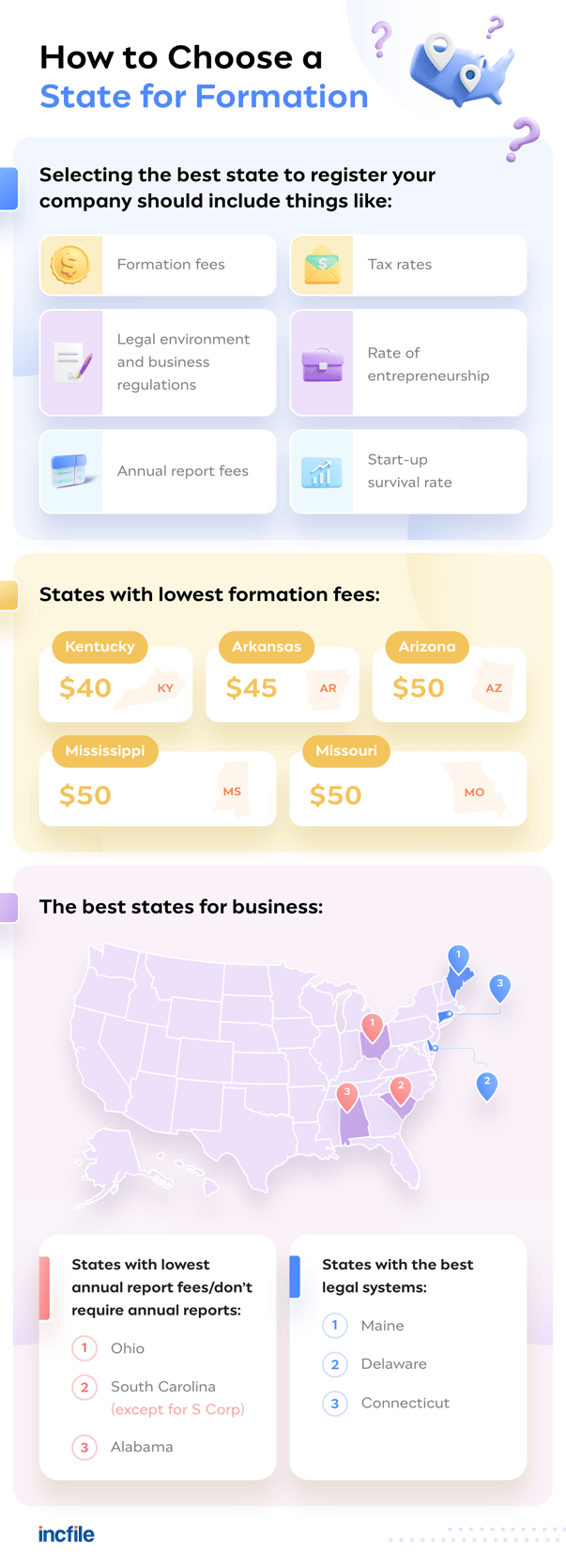Start with a Business Name Search
The first step in registering a business name is to ensure your desired name is available. Why? If your proposed business name is already in use by another business, then your name reservation or LLC formation application will be rejected.
There are several searches you can perform to cover all your bases:
- Business name search
- Domain name search
- Federal trademark search
The easiest search to start with is a business entity name search, typically found on your Secretary of State's website. You can also use Incfile's Business Name Search Tool.

We also recommend conducting a domain name search. This is in anticipation of building a website for your small business. Searching for a domain name before registering for a business name will also help create cohesive branding. For instance, if your proposed business name is Mini Blossoms, but that domain name is unavailable, you could consider making a few tweaks to get an exact match between the proposed business name and domain name.
Lastly, conduct a federal-level trademark search to see if anyone has a trademark on your name. This quick search could potentially save you from any hefty trademark lawsuits.
4 Ways to Register a Business Name
Once you have taken all the steps to ensure your chosen business name is available, you can register the business name to make it officially yours.
There are four ways you can register a business name:
- Form a legal entity (LLC or Corp).
- Reserve a name.
- File for DBA or Assumed Name.
- Apply for a trademark.
Each process has its list of pros and cons. You should decide which way you want to proceed based on your business's current and future needs.
 1. Form a Legal Entity
1. Form a Legal Entity
You can register a business name by forming a legal business entity. When you file your Corp or LLC registration forms, you're asked to provide a legal business name.
This name needs to be available and abide by the state's business naming mandate.
Once the formation paperwork is accepted, no other business in the state can use the same business name. If you wish to grow your business to another state (something to think about down the line), you'd have to run a business name availability search again and file for a Certificate of Authority in the new state of business.
Tip: Use Incfile's Business Name Search Tool to identify if your proposed business name is available.
2. Reserve a Name
While not all states require reserving a business name, this method makes sense if you aren't quite ready to form a legal entity but want your chosen name to be taken off the market.
Know that the state will only hold on to your reserved name for a certain duration, such as 60 or 90 days. Once that time frame is up, the name is back up for grabs for any other business. So if you reserve a name, ensure that you file your business formation paperwork within the time frame so the perfect name remains yours.
3. File for a DBA or Assumed Name
Filing for a DBA "doing business as" or assumed name allows you, as a sole proprietor, LLC or partnership or conduct business under a name that's not your legal business name.
In the case of a sole proprietorship, your legal name is your business name. Let's look at an example — if your name is "Rose Thomas," but you are promoting your freelance writing business as Rose Writes (that's what's on your business card and website domain), you need to have a DBA.
Now, let's examine a case of an LLC. If you registered your LLC as Rose Thomas LLC but are promoting it at "Rose Writes," you would also need to file for a DBA to ensure nobody else in the state or county is using that name.
In some instances, DBAs, also known as fictitious business names in several states, may only provide name protection at a local or county level. It's best to check with your Secretary of State's website or local business registration office to understand how DBAs are issued.
Tip: DBAs are generally valid for five years, so remember to renew them and pay the required fees.
4. Apply for a Trademark
Another way to establish ownership over a name is to apply for a trademark or service mark at the state level. Some states provide this service, but the requirements also vary (again, our all-state business name registration guide above can help).
Tip: Trademarks issued by the state only protect name or logo from being misused or copied within state borders.
A more complicated way to register a trademark is via the United States Patent and Trademark Office. Getting a federal-level trademark ensures your name remains a one-of-a-kind across the country and provides more legal rights than state registration. However, the process is lengthy and the application rejection rate is high at 30-50 percent!
But, if you decide that applying for a federal trademark is best suited for your case, then Incfile's Trademark Service can help you increase your chances of approval. Our experienced trademark lawyer will aid in preparing and filing the documentation and will be your touchpoint through the process.
State-Specific Rules for Registering a Business Name
Register a Business Name in Texas
The first step in registering a business name in Texas is running a name search to ensure the desired name is available. If it's available, you can register the business name by filing the Articles of Organization online or by mail.
Sole proprietors, LLCs and partnerships operating their business under a different name must file for a DBA with their local county clerk's office.
Register a Business Name in California
Like Texas, you can register a business name in California by filing your Articles of Organization or a DBA (this is a must if you're operating a business that's not your legal name).
Businesses registering a DBA in the Sunshine state should be aware that the state does have notice of publication requirement. Within 30 days of filing a DBA, you're required to publish a statement in the local newspaper for four consecutive weeks.
Register a Business Name in GA
To register a business name in Georgia, check that the chosen name meets the state's naming standards. Then you can run a business name search to make sure your DBA application or formation paperwork isn't rejected because the name's already in use.
If you aren't quite ready to submit formation paperwork, you can reserve a business name for 30 days by filling out a name reservation form and paying the associated fee of $25.
Which State Is Best to Register a Company in the USA?
Delaware, Nevada and Wyoming are typically touted as the "best" states to register your business in. The states' low incorporation fees and tax rates make them attractive to many, but a lot of these benefits are primarily reserved for local or larger corporations.
A lot also depends on what your criteria is. Some states may have low formation fees, but their annual report fees can be high or their general business survival rate or legal environment might not be the most favorable.

Ready to Register Your Business Name?
Determining the best way to register a business name comes down to your needs and requirements — the structure you choose, the products you're selling and the geographic reach of the business.
Regardless of the method you finally decide on, one step remains crucial. The business name has to be available. Not sure where to begin? Check out Incfile's Business Name Search Tool. Simply tell us your desired name and we'll search all the relevant directories on your behalf and tell you whether your chosen business name is taken or not. It's really that quick and simple.
And, the good news doesn't end there...if there's a match, Incfile can even help you register the business name.

